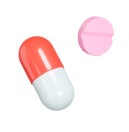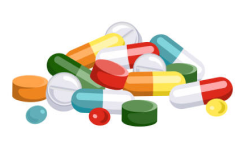Uses
What is Cyclophosphamide Injection for?
Cyclophosphamide Injection belongs to a class of medicines called immunosuppressant. It suppresses the body's immune response by blocking the production of DNA in the body. It helps to reduce inflammation, which in turn, reduces symptoms and complications in the lung, skin, joints and other organs.
Cyclophosphamide is used to treat autoimmune diseases (disease where the body's natural defence system attacks own body cells such as:
- Systemic lupus erythematosus
- Systemic sclerosis
- Systemic vasculitis
How should I take or use Cyclophosphamide Injection?
Cyclophosphamide should be taken as prescribed by the doctor.. It can also be given by injection at the hospital every 1 to 2 week or every month.
Cyclophosphamide injection may be prescribed at a higher dose as compared to a typical oral adult dose which ranges from 50 milligrams to 150 milligrams to achieve faster control in more severe condition. Your doctor may reduce the dose if you have kidney or liver problem.
What should I do if I forget to take or use Cyclophosphamide Injection?
If you forget your appointment and miss your injection, please make another appointment as soon as possible to arrange for next injection. Inform your doctor that you have missed your injection.
Precaution
What food or medication should I avoid when I take or use Cyclophosphamide Injection?
Avoid raw (e.g. sashimi) or half-cooked foods (e.g. half-boiled eggs) to prevent food poisoning.
Side Effects
What are some common side effects of Cyclophosphamide Injection?
Side effects may occur when taking Cyclophosphamide, but the majority of these effects tend to resolve spontaneously. Common side effects include:
- Nausea and vomiting (can be controlled with anti-nausea medicines)
- Hair loss (reversible once the medicine is stopped)
- Loss of appetite or weight
- Feeling tired or weakness
- Darkened skin colour
- Change in colour or growth of finger or toe nails
Consult your doctor or pharmacist about any symptoms that becomes bothersome.
Handling
How should I store Cyclophosphamide Injection?
- Keep away from children
- Keep in a cool, dry place, away from direct sunlight
- Store at room temperature
For more information
What are the special precautions while taking the medicine?
STOP taking Cyclophosphamide and let your doctor know if you develop an allergic reaction. Rash due to allergic reaction to Cyclophosphamide is rare. Possible symptoms of allergic reaction are:
- rash, hives, or itching
- red, swollen, blistered or peeling skin with or without fever
- wheezing or tightness in the chest or throat
- trouble breathing or talking
- unusual hoarseness
- swelling of the mouth, face, lips, tongue or throat
Cyclophosphamide may increase risk of developing certain kinds of infections due to reduced white blood cells (a key component of the body's immune system that helps to fight infections). Tell your doctor immediately if you experience any symptoms of infection such as temperature exceeding 38°C, chills, cough, painful or bloody urination, feeling very tired or weak.
Although rare, Cyclophosphamide may increase the risk of developing certain kinds of cancers, such as bladder cancer. The risk is higher with long term use and higher cumulative doses of Cyclophosphamide. Your doctor will perform periodic screening to manage the risk.
While having treatment with Cyclophosphamide, you must see your doctor as scheduled to monitor response to treatment and minimize any possible side effect.
Can I get PREGNANT or BREASTFEED?
Cyclophosphamide may cause infertility in both men and women. Although women taking Cyclophosphamide can stop having menses, some may experience early menopause, they can still become pregnant.
Both men and women of childbearing age must use a reliable method of contraception to avoid the risk of an unplanned pregnancy as Cyclophosphamide can cause serious defects to unborn child. You should not plan to have children while taking Cyclophosphamide or for a while after treatment.
Cyclophosphamide passes into human breast milk and may cause serious unwanted effects to the child. You should not breastfeed if you are taking Cyclophosphamide.
In SUMMARY... what you need to know about Cyclophosphamide?
Cyclophosphamide Injection is given at the hospital every 1-2 week or every month. A higher dose may be prescribed compared to the oral dose of 50 milligrams to 150 milligrams so as to achieve faster control in more sever condition.
If you missed an appointment, schdule another appointment as soon as possible and inform your doctor that you have missed your injection.
Patient can experience side effects such as nausea and vomitting, hair loss, loss of appetite or weight, feeling tired or weakness, darkened skin colour and change in colour or growth of finger or toe nails. All these effects then to resolve spontaneously.
Disclaimers
If you take more than the recommended dose, please seek medical advice immediately. The information provided on this page does not replace information from your healthcare professional. Please consult your healthcare professional for more information.
This article is jointly developed by members of the National Medication Information workgroup. The workgroup consists of cluster partners (National Healthcare Group, National University Health System, and SingHealth), community pharmacies (Guardian, Unity, and Watsons), and the Pharmaceutical Society of Singapore. The content does not reflect drug availability and supply information in pharmacies and healthcare institutions. You are advised to check with the respective institutions for such information.
Last Updated on March 2017

Need More Medicine?
Use Medicine Order Service on HealthBuddy.

Medicines Reminder
Get reminders and chart progress on HealthBuddy.




















